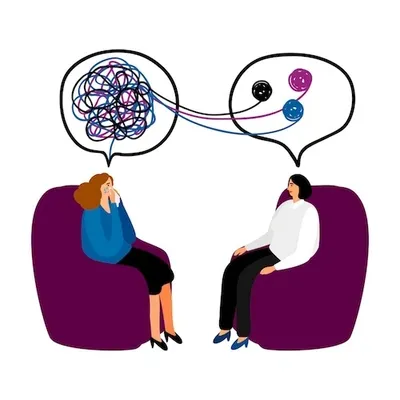Cognitive Behavioural Therapy (CBT)
- Evidence-based psychological therapy
- Children, teenagers, & young adults
- We Accept Private Health
- In Person & telehealth appointments available
Cognitive Behavioural Therapy (CBT) is a widely recognized and evidence-based psychotherapeutic approach used to help individuals address a variety of emotional, behavioural, and psychological issues. Developed by Aaron T. Beck in the 1960s, CBT is grounded in the idea that our thoughts, feelings, and behaviours are interconnected, and it aims to promote positive changes in these domains.

information and appointments, please get in touch.
Foundational Principles
CBT is rooted in several core principles. It asserts that our thoughts, emotions, and behaviours are interconnected, and by modifying one of these components, we can influence the others. CBT operates on the assumption that maladaptive thinking patterns can contribute to emotional distress and problematic behaviour.
Collaborative and Time-Limited
CBT is typically delivered in a structured and time-limited manner. It often involves a therapist and a client working together to set goals, identify problems, and develop strategies for change. Treatment duration can vary but is generally shorter than other therapeutic modalities.
Thought Records
Clients in CBT often keep thought records or journals to track their thoughts and associated emotions. This tool helps individuals become more aware of their thought patterns and the emotional responses they trigger.
Behavioural Experiments
CBT frequently incorporates behavioural experiments, which involve testing and challenging unhelpful beliefs and assumptions. This process helps clients gather evidence to evaluate the accuracy of their thoughts and beliefs.
Skill Building
CBT equips individuals with practical skills to manage their thoughts and emotions. These skills include problem-solving, assertiveness training, relaxation techniques, and communication skills.
Homework Assignments
CBT often includes homework assignments that encourage clients to practice the skills learned during therapy sessions in their everyday lives. This helps reinforce the therapeutic work and promote lasting change.
Empirical Support
CBT is one of the most extensively researched and evidence-based psychotherapies. Numerous studies have demonstrated its effectiveness in treating a wide range of mental health conditions, including depression, anxiety disorders, post-traumatic stress disorder, and more.
Applicability
CBT is versatile and can be adapted to various settings and populations. It is used in individual therapy, group therapy, and even self-help resources. It has applications in treating both acute and chronic mental health issues.
Patient-Cantered
CBT is tailored to the individual's unique needs and goals. Therapists work collaboratively with clients to create a personalized treatment plan.
In summary, Cognitive Behavioural Therapy is a goal-oriented and time-limited psychotherapeutic approach that emphasizes the interplay between thoughts, emotions, and behaviours. It provides individuals with practical skills to identify and challenge unhelpful thought patterns, leading to positive changes in emotional well-being and behaviour. With a strong empirical foundation, CBT is a widely used and effective treatment for various mental health issues.



![AP&CO_27[9991]](https://adelaidepsychologyandco.com.au/wp-content/uploads/2023/09/APCO_279991-scaled.jpg)







![Sherin Adelaide Psychology - Headshots-9[16464]](https://adelaidepsychologyandco.com.au/wp-content/uploads/2021/04/Sherin-Adelaide-Psychology-Headshots-916464-150x150.jpg)


